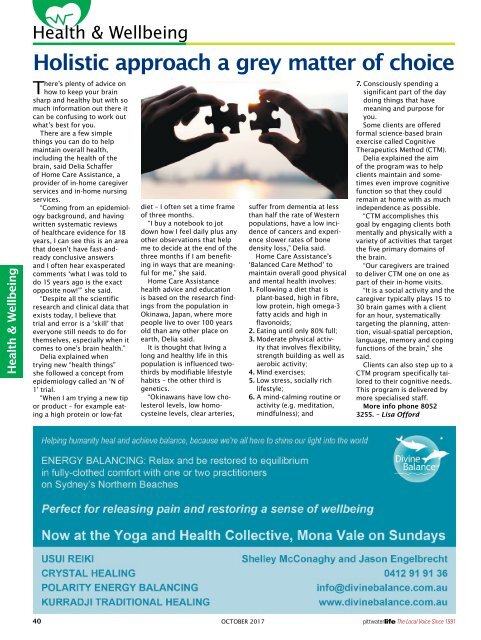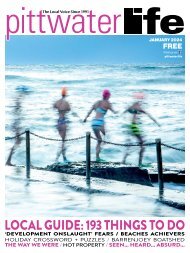Pittwater Life October 2017 Issue
Bill & Alfred. Election Deep Dive. Secret Men's Business. Eyes in the Sky.
Bill & Alfred. Election Deep Dive. Secret Men's Business. Eyes in the Sky.
Create successful ePaper yourself
Turn your PDF publications into a flip-book with our unique Google optimized e-Paper software.
Health & Wellbeing<br />
Health & Wellbeing<br />
Holistic approach a grey matter of choice<br />
There’s plenty of advice on<br />
how to keep your brain<br />
sharp and healthy but with so<br />
much information out there it<br />
can be confusing to work out<br />
what’s best for you.<br />
There are a few simple<br />
things you can do to help<br />
maintain overall health,<br />
including the health of the<br />
brain, said Delia Schaffer<br />
of Home Care Assistance, a<br />
provider of in-home caregiver<br />
services and in-home nursing<br />
services.<br />
“Coming from an epidemiology<br />
background, and having<br />
written systematic reviews<br />
of healthcare evidence for 18<br />
years, I can see this is an area<br />
that doesn’t have fast-andready<br />
conclusive answers<br />
and I often hear exasperated<br />
comments ‘what I was told to<br />
do 15 years ago is the exact<br />
opposite now!’” she said.<br />
“Despite all the scientific<br />
research and clinical data that<br />
exists today, I believe that<br />
trial and error is a ‘skill’ that<br />
everyone still needs to do for<br />
themselves, especially when it<br />
comes to one’s brain health.”<br />
Delia explained when<br />
trying new “health things”<br />
she followed a concept from<br />
epidemiology called an ‘N of<br />
1’ trial.<br />
“When I am trying a new tip<br />
or product – for example eating<br />
a high protein or low-fat<br />
diet – I often set a time frame<br />
of three months.<br />
“I buy a notebook to jot<br />
down how I feel daily plus any<br />
other observations that help<br />
me to decide at the end of the<br />
three months if I am benefiting<br />
in ways that are meaningful<br />
for me,” she said.<br />
Home Care Assistance<br />
health advice and education<br />
is based on the research findings<br />
from the population in<br />
Okinawa, Japan, where more<br />
people live to over 100 years<br />
old than any other place on<br />
earth, Delia said.<br />
It is thought that living a<br />
long and healthy life in this<br />
population is influenced twothirds<br />
by modifiable lifestyle<br />
habits – the other third is<br />
genetics.<br />
“Okinawans have low cholesterol<br />
levels, low homocysteine<br />
levels, clear arteries,<br />
suffer from dementia at less<br />
than half the rate of Western<br />
populations, have a low incidence<br />
of cancers and experience<br />
slower rates of bone<br />
density loss,” Delia said.<br />
Home Care Assistance’s<br />
‘Balanced Care Method’ to<br />
maintain overall good physical<br />
and mental health involves:<br />
1. Following a diet that is<br />
plant-based, high in fibre,<br />
low protein, high omega-3<br />
fatty acids and high in<br />
flavonoids;<br />
2. Eating until only 80% full;<br />
3. Moderate physical activity<br />
that involves flexibility,<br />
strength building as well as<br />
aerobic activity;<br />
4. Mind exercises;<br />
5. Low stress, socially rich<br />
lifestyle;<br />
6. A mind-calming routine or<br />
activity (e.g. meditation,<br />
mindfulness); and<br />
7. Consciously spending a<br />
significant part of the day<br />
doing things that have<br />
meaning and purpose for<br />
you.<br />
Some clients are offered<br />
formal science-based brain<br />
exercise called Cognitive<br />
Therapeutics Method (CTM).<br />
Delia explained the aim<br />
of the program was to help<br />
clients maintain and sometimes<br />
even improve cognitive<br />
function so that they could<br />
remain at home with as much<br />
independence as possible.<br />
“CTM accomplishes this<br />
goal by engaging clients both<br />
mentally and physically with a<br />
variety of activities that target<br />
the five primary domains of<br />
the brain.<br />
“Our caregivers are trained<br />
to deliver CTM one on one as<br />
part of their in-home visits.<br />
“It is a social activity and the<br />
caregiver typically plays 15 to<br />
30 brain games with a client<br />
for an hour, systematically<br />
targeting the planning, attention,<br />
visual-spatial perception,<br />
language, memory and coping<br />
functions of the brain,” she<br />
said.<br />
Clients can also step up to a<br />
CTM program specifically tailored<br />
to their cognitive needs.<br />
This program is delivered by<br />
more specialised staff.<br />
More info phone 8052<br />
3255. – Lisa Offord<br />
40 OCTOBER <strong>2017</strong><br />
The Local Voice Since 1991

















